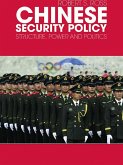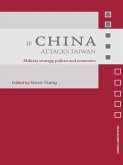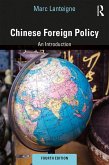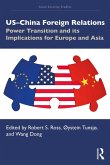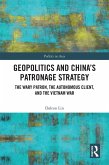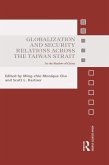52,95 €
52,95 €
inkl. MwSt.
Sofort per Download lieferbar

26 °P sammeln
52,95 €
Als Download kaufen

52,95 €
inkl. MwSt.
Sofort per Download lieferbar

26 °P sammeln
Jetzt verschenken
Alle Infos zum eBook verschenken
52,95 €
inkl. MwSt.
Sofort per Download lieferbar
Alle Infos zum eBook verschenken

26 °P sammeln
- Format: ePub
- Merkliste
- Auf die Merkliste
- Bewerten Bewerten
- Teilen
- Produkt teilen
- Produkterinnerung
- Produkterinnerung

Bitte loggen Sie sich zunächst in Ihr Kundenkonto ein oder registrieren Sie sich bei
bücher.de, um das eBook-Abo tolino select nutzen zu können.
Hier können Sie sich einloggen
Hier können Sie sich einloggen
Sie sind bereits eingeloggt. Klicken Sie auf 2. tolino select Abo, um fortzufahren.

Bitte loggen Sie sich zunächst in Ihr Kundenkonto ein oder registrieren Sie sich bei bücher.de, um das eBook-Abo tolino select nutzen zu können.
This volume provides a coherent and comprehensive overview of Chinese security policy, comprising essays written by one of America's leading scholars.
- Geräte: eReader
- mit Kopierschutz
- eBook Hilfe
- Größe: 0.57MB
Andere Kunden interessierten sich auch für
![Chinese Security Policy (eBook, PDF) Chinese Security Policy (eBook, PDF)]() Robert RossChinese Security Policy (eBook, PDF)52,95 €
Robert RossChinese Security Policy (eBook, PDF)52,95 €![If China Attacks Taiwan (eBook, ePUB) If China Attacks Taiwan (eBook, ePUB)]() If China Attacks Taiwan (eBook, ePUB)48,95 €
If China Attacks Taiwan (eBook, ePUB)48,95 €![Taiwan's Security in the Post-Deng Xiaoping Era (eBook, ePUB) Taiwan's Security in the Post-Deng Xiaoping Era (eBook, ePUB)]() Martin L. LasaterTaiwan's Security in the Post-Deng Xiaoping Era (eBook, ePUB)50,95 €
Martin L. LasaterTaiwan's Security in the Post-Deng Xiaoping Era (eBook, ePUB)50,95 €![Chinese Foreign Policy (eBook, ePUB) Chinese Foreign Policy (eBook, ePUB)]() Marc LanteigneChinese Foreign Policy (eBook, ePUB)40,95 €
Marc LanteigneChinese Foreign Policy (eBook, ePUB)40,95 €![US-China Foreign Relations (eBook, ePUB) US-China Foreign Relations (eBook, ePUB)]() US-China Foreign Relations (eBook, ePUB)40,95 €
US-China Foreign Relations (eBook, ePUB)40,95 €![Geopolitics and China's Patronage Strategy (eBook, ePUB) Geopolitics and China's Patronage Strategy (eBook, ePUB)]() Dalton LinGeopolitics and China's Patronage Strategy (eBook, ePUB)39,95 €
Dalton LinGeopolitics and China's Patronage Strategy (eBook, ePUB)39,95 €![Globalization and Security Relations across the Taiwan Strait (eBook, ePUB) Globalization and Security Relations across the Taiwan Strait (eBook, ePUB)]() Globalization and Security Relations across the Taiwan Strait (eBook, ePUB)45,95 €
Globalization and Security Relations across the Taiwan Strait (eBook, ePUB)45,95 €-
-
-
This volume provides a coherent and comprehensive overview of Chinese security policy, comprising essays written by one of America's leading scholars.
Dieser Download kann aus rechtlichen Gründen nur mit Rechnungsadresse in A, B, BG, CY, CZ, D, DK, EW, E, FIN, F, GR, HR, H, IRL, I, LT, L, LR, M, NL, PL, P, R, S, SLO, SK ausgeliefert werden.
Produktdetails
- Produktdetails
- Verlag: Taylor & Francis eBooks
- Seitenzahl: 352
- Erscheinungstermin: 20. Mai 2009
- Englisch
- ISBN-13: 9781135968816
- Artikelnr.: 38458886
- Verlag: Taylor & Francis eBooks
- Seitenzahl: 352
- Erscheinungstermin: 20. Mai 2009
- Englisch
- ISBN-13: 9781135968816
- Artikelnr.: 38458886
- Herstellerkennzeichnung Die Herstellerinformationen sind derzeit nicht verfügbar.
Robert S. Ross is Professor of Political Science at Boston College, Associate, John King Fairbank Center for East Asian Research, Harvard University, and Senior Advisor, Security Studies Program, Massachusetts Institute of Technology.
Introduction: Structure, Power, and Politics in Chinese Security Policy
Part 1: Great Power Politics and East Asian Security 1. China Learns to
Compromise: Change in U.S.-China Relations, 1982-1984 (1991) 2. The
Geography of the Peace: Great Power Stability in Twenty-First Century East
Asia (1999) 3. The U.S.-China Peace: Great Power Politics, Spheres of
Influence, and the Peace of East Asia (2003) 4. Balance of Power Politics
and the Rise of China: Accommodation and Balancing in East Asia (2006)
Part 2: Deterrence and Coercive Diplomacy in Chinese Security Policy 5.
China and the Cambodian Peace Process: The Value of Coercive Diplomacy
(1991) 6. The 1995-96 Taiwan Strait Confrontation: Coercion, Credibility,
and Use of Force (2000) 7. Navigating the Taiwan Strait: Deterrence,
Escalation Dominance, and U.S.-China Relations (2002) Part 3: Domestic
Politics and Foreign Policy 8. International Bargaining and Domestic
Politics: Conflict in U.S.-China Relations Since 1972 (1986) 9. From Lin
Biao to Deng Xiaoping: Elite Instability and China's U.S. Policy (1989) 10.
The Diplomacy of Tiananmen: Two-Level Bargaining and Great Power
Cooperation (2001)
Part 1: Great Power Politics and East Asian Security 1. China Learns to
Compromise: Change in U.S.-China Relations, 1982-1984 (1991) 2. The
Geography of the Peace: Great Power Stability in Twenty-First Century East
Asia (1999) 3. The U.S.-China Peace: Great Power Politics, Spheres of
Influence, and the Peace of East Asia (2003) 4. Balance of Power Politics
and the Rise of China: Accommodation and Balancing in East Asia (2006)
Part 2: Deterrence and Coercive Diplomacy in Chinese Security Policy 5.
China and the Cambodian Peace Process: The Value of Coercive Diplomacy
(1991) 6. The 1995-96 Taiwan Strait Confrontation: Coercion, Credibility,
and Use of Force (2000) 7. Navigating the Taiwan Strait: Deterrence,
Escalation Dominance, and U.S.-China Relations (2002) Part 3: Domestic
Politics and Foreign Policy 8. International Bargaining and Domestic
Politics: Conflict in U.S.-China Relations Since 1972 (1986) 9. From Lin
Biao to Deng Xiaoping: Elite Instability and China's U.S. Policy (1989) 10.
The Diplomacy of Tiananmen: Two-Level Bargaining and Great Power
Cooperation (2001)
Introduction: Structure, Power, and Politics in Chinese Security Policy Part 1: Great Power Politics and East Asian Security 1. China Learns to Compromise: Change in U.S.-China Relations, 1982-1984 (1991) 2. The Geography of the Peace: Great Power Stability in Twenty-First Century East Asia (1999) 3. The U.S.-China Peace: Great Power Politics, Spheres of Influence, and the Peace of East Asia (2003) 4. Balance of Power Politics and the Rise of China: Accommodation and Balancing in East Asia (2006) Part 2: Deterrence and Coercive Diplomacy in Chinese Security Policy 5. China and the Cambodian Peace Process: The Value of Coercive Diplomacy (1991) 6. The 1995-96 Taiwan Strait Confrontation: Coercion, Credibility, and Use of Force (2000) 7. Navigating the Taiwan Strait: Deterrence, Escalation Dominance, and U.S.-China Relations (2002) Part 3: Domestic Politics and Foreign Policy 8. International Bargaining and Domestic Politics: Conflict in U.S.-China Relations Since 1972 (1986) 9. From Lin Biao to Deng Xiaoping: Elite Instability and China's U.S. Policy (1989) 10. The Diplomacy of Tiananmen: Two-Level Bargaining and Great Power Cooperation (2001)
Introduction: Structure, Power, and Politics in Chinese Security Policy
Part 1: Great Power Politics and East Asian Security 1. China Learns to
Compromise: Change in U.S.-China Relations, 1982-1984 (1991) 2. The
Geography of the Peace: Great Power Stability in Twenty-First Century East
Asia (1999) 3. The U.S.-China Peace: Great Power Politics, Spheres of
Influence, and the Peace of East Asia (2003) 4. Balance of Power Politics
and the Rise of China: Accommodation and Balancing in East Asia (2006)
Part 2: Deterrence and Coercive Diplomacy in Chinese Security Policy 5.
China and the Cambodian Peace Process: The Value of Coercive Diplomacy
(1991) 6. The 1995-96 Taiwan Strait Confrontation: Coercion, Credibility,
and Use of Force (2000) 7. Navigating the Taiwan Strait: Deterrence,
Escalation Dominance, and U.S.-China Relations (2002) Part 3: Domestic
Politics and Foreign Policy 8. International Bargaining and Domestic
Politics: Conflict in U.S.-China Relations Since 1972 (1986) 9. From Lin
Biao to Deng Xiaoping: Elite Instability and China's U.S. Policy (1989) 10.
The Diplomacy of Tiananmen: Two-Level Bargaining and Great Power
Cooperation (2001)
Part 1: Great Power Politics and East Asian Security 1. China Learns to
Compromise: Change in U.S.-China Relations, 1982-1984 (1991) 2. The
Geography of the Peace: Great Power Stability in Twenty-First Century East
Asia (1999) 3. The U.S.-China Peace: Great Power Politics, Spheres of
Influence, and the Peace of East Asia (2003) 4. Balance of Power Politics
and the Rise of China: Accommodation and Balancing in East Asia (2006)
Part 2: Deterrence and Coercive Diplomacy in Chinese Security Policy 5.
China and the Cambodian Peace Process: The Value of Coercive Diplomacy
(1991) 6. The 1995-96 Taiwan Strait Confrontation: Coercion, Credibility,
and Use of Force (2000) 7. Navigating the Taiwan Strait: Deterrence,
Escalation Dominance, and U.S.-China Relations (2002) Part 3: Domestic
Politics and Foreign Policy 8. International Bargaining and Domestic
Politics: Conflict in U.S.-China Relations Since 1972 (1986) 9. From Lin
Biao to Deng Xiaoping: Elite Instability and China's U.S. Policy (1989) 10.
The Diplomacy of Tiananmen: Two-Level Bargaining and Great Power
Cooperation (2001)
Introduction: Structure, Power, and Politics in Chinese Security Policy Part 1: Great Power Politics and East Asian Security 1. China Learns to Compromise: Change in U.S.-China Relations, 1982-1984 (1991) 2. The Geography of the Peace: Great Power Stability in Twenty-First Century East Asia (1999) 3. The U.S.-China Peace: Great Power Politics, Spheres of Influence, and the Peace of East Asia (2003) 4. Balance of Power Politics and the Rise of China: Accommodation and Balancing in East Asia (2006) Part 2: Deterrence and Coercive Diplomacy in Chinese Security Policy 5. China and the Cambodian Peace Process: The Value of Coercive Diplomacy (1991) 6. The 1995-96 Taiwan Strait Confrontation: Coercion, Credibility, and Use of Force (2000) 7. Navigating the Taiwan Strait: Deterrence, Escalation Dominance, and U.S.-China Relations (2002) Part 3: Domestic Politics and Foreign Policy 8. International Bargaining and Domestic Politics: Conflict in U.S.-China Relations Since 1972 (1986) 9. From Lin Biao to Deng Xiaoping: Elite Instability and China's U.S. Policy (1989) 10. The Diplomacy of Tiananmen: Two-Level Bargaining and Great Power Cooperation (2001)

